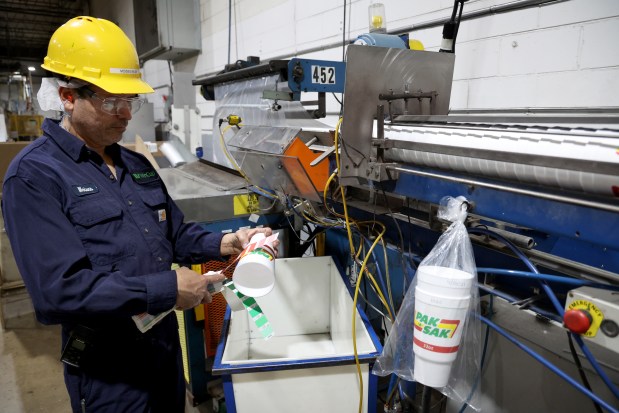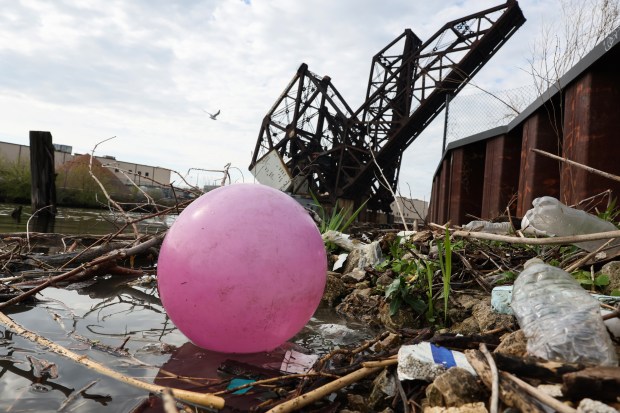After more than a decade of negotiations and failed efforts to reduce the use of plastics, Illinois lawmakers are considering legislation that would prohibit large retailers from offering single-use plastic bags and ban the use of most polystyrene containers in the state over the next four to five years.
Advocates, citing the threat of rising plastic waste to human and environmental health, say the timing for the bills is ripe given rising health concerns about microplastics and the passage of similar legislation in states like New Jersey and California. Retailers also support the measures, calling the requirements balanced and flexible, according to a statement from the Illinois Retail Merchants Association.
But at the same time, President Donald Trump’s administration is moving in an opposite direction, with Trump declaring America is going “back to plastic” by reversing federal restrictions on plastic drinking straws and dismantling departments that regulate plastic pollution.
In addition, some labor unions, including the Illinois Pipe Trades Association and AFL-CIO, oppose the move to do away with foam food containers. Manufacturers have expressed concerns the measures could lead to thousands of layoffs if the facilities that make the banned products are forced to shut down as their in-state customer base disappears.
Two bills are awaiting a vote in the state Senate. One measure would use financial penalties under the jurisdiction of the attorney general and local state’s attorney offices to restrict the sale or distribution of disposable containers made of polystyrene — known by the brand name Styrofoam — with the exception of egg cartons, starting in January 2030. The other bill would prohibit retailers with more than a dozen stores from offering or making available single-use checkout bags by January 2029.
State Sen. Laura Fine, a Democrat from Glenview who’s sponsoring the foam container bill, said there are alternatives to polystyrene and plastic bags and that the measures are necessary “to get the bad products off the market so we could have a cleaner environment and help our kids.”
Environmental advocates widely agree there’s an unhealthy proliferation of plastic waste and that plastic bags and polystyrene are the “worst of the worst,” partly because of how long these products take to decompose, said Emily Kowalski, outreach engagement manager with Environment Illinois. She noted about 22 million pounds of plastics enter the Great Lakes every year, according to 2022 estimates from the Rochester Institute of Technology.
“Nothing we use for just a few minutes should be allowed to pollute our water and environment for hundreds of years,” Kowalski said.
Volunteers with the Alliance for the Great Lakes have collected more than 10 million pieces of litter in the past 20 years at beaches of the five Great Lakes, 86% of it partially or fully plastic, according to Andrea Densham, senior policy adviser with the environmental organization. Polystyrene foam pieces were the third most common litter item that volunteers found over the years. Densham said this is a threat to drinking water and the lakes, citing that the Great Lakes hold 20% of the world’s fresh water and provide drinking water for over 40 million people.
According to a 2024 study in the research publication Frontiers, continued exposure to microplastics through ingestion and inhalation can lead to inflammation, gastrointestinal disorders and chronic diseases.
There have been previous efforts to reduce plastic in the state, such as Chicago’s tax on plastic bags that increased from 7 cents to 10 cents per bag in January 2025 and a 2023 state law banning foam foodware at state facilities that went into effect this January. Advocates say these initiatives haven’t been entirely effective.
“I’ve seen there’s still foam in the Stratton cafeteria, so I would like to see the state leading by example,” said Jack Darin, director of the Illinois Sierra Club chapter, referring to a state government office building in Springfield that was required to stop procuring foam, or polystyrene, for use by January 2025 under the 2023 law.
Sen. Cristina Castro’s bill to ban plastic bags contains a provision that would eliminate municipal taxes on plastic bags by 2029, including Chicago’s, which at 7 cents a bag in 2023 generated more than $17 million. Castro, of Elgin, said municipalities have not been using the extra cash to support sustainable initiatives, as was intended by advocates. An outright ban, instead of a tax, would be more successful in limiting plastic waste, Castro said.
“Instead of using the money for sustainability programs, a lot of them (municipalities) have used it for filling the coffers or plugging some other hole, which has frustrated a lot of the environmentalists, activists, who have said, ‘Hey, that was supposed to help with recycling and things like that,’” said Castro.
The Illinois Municipal League opposes the bill because of the provision dropping the bag tax, which it argues preempts local regulatory authority, the group’s CEO, Brad Cole, said.
Manufacturers and the unions take issue with Fine’s foam foodware bill, arguing the measure would only shift consumers to use another type of plastic and cause significant job losses at polystyrene manufacturing plants.
While the bills do not ban the production of polystyrene, Donovan Griffith, vice president for government affairs for the Illinois Manufacturers Association, said a loss of in-state customers holds a “real potential for job losses.”
Keith Clark, CEO of Dart Container, a polystyrene manufacturing company that employs more than 1,400 people in Illinois at facilities in Chicago, North Aurora and Country Club Hills, told the Tribune that the legislation, if passed, would “certainly require us to reassess our Illinois operations in the coming years.”

Brad Laporte, CEO of WinCup, a polystyrene manufacturer with two facilities outside of Chicago, said he worked with Illinois lawmakers to get the ban deadline extended to 2030 but still opposes it, saying the measure could even ban the company’s new biodegradable foam foodware. Those products can decompose by 92% over four years in certain landfills, according to the company’s website.
Griffith also said polystyrene containers are cheaper and in some ways more environmentally friendly than alternatives that require more energy to produce, a point some environmental advocates take issue with.
The four- to five-year runway before the measures would take effect is intended to give municipalities time to fill gaps in tax revenue, consumers to adjust behavior, large retailers to eliminate bag use and foam foodware and manufacturers to prepare for losing revenue from large retailers.
“This is a change in the way organizations do business,” said Fine, acknowledging her conversations with opponents of the bills. “This is a huge step, but we have to protect our Great Lakes and our waterways and this is part of that process.”



